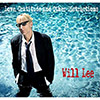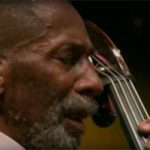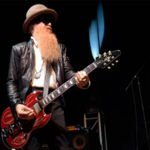Late night bassist tells FBPO all about his brand new solo release — the music, the players and the inspiration!
Exclusive interview with FBPO’s Jon Liebman
August 19, 2013
Best known as the long-time bassist for the Late Show with David Letterman, Will Lee has toured with B.J. Thomas, Horace Silver, Bette Midler, Barry Manilow, The Brecker Brothers, Herbie Mann and many others. Equally talented as both a bassist and vocalist, Will has sung and played bass on over 1,600 pop, jazz and rock albums as well as a great many radio and television commercials. He is also the founder of the Fab Faux, a very popular Beatles tribute band.
FBPO’s Jon Liebman talked with will about his newest solo release, Love, Gratitude and Other Distractions.
FBPO: It sure has been a while since your last solo album release, Oh!, back in the ’90s!
WL: I figure every twenty years is a good place to start! Believe me, the next one will be out in the next five years, if not two and-a-half or three.
FBPO: After such a long hiatus, what inspired this new album?
WL: Actually, I didn’t look at it as an album at all. It was a bit of the songwriter in me, I think. The ideas just got to be so crowded in my head that they had to come out, which means the painstaking aspect of actually sitting down and finishing the ideas until they became songs. It also means that I brought in some really talented people to write with. Dave Delhomme, for example, helped me harmonically on the instrumental called “Papounet’s Ride”—and by the way, Papounet is my father-in-law and he drives like a maniac! I tried to convey the feeling of being in the car with your life in his hands when he’s just whizzing down these roads as a competitive driver.
FBPO: You really run the gamut of the emotional spectrum with these songs, sometimes poignant and sweet, sometimes angry, sometimes bouncy and fun. How did you manage to weave that all together so cohesively?
WL: I don’t know. I think the reason there are so many flavors is that we have all these different sides to us. My concept is to try to convey some kind of mood or feeling for each song. You know how you can hear a sound or a chord or a long, drawn out modal sound with several notes in it and it just conveys a mood? If any of the songs were looking like they were heading in the direction of a mood, I kind of wanted to keep it there. If I was in a good mood, or if it was a jolly tune, I would keep it jolly and try to just stay on that plane and not think of the other songs along the way. I would just kind of make that tune my whole life when I was working on it.
FBPO: You’ve got some real star power on this album: Paul Shaffer, Billy Gibbons, Allen Toussaint, Hugh McCracken – I can go on and on – Bob James, Narada Michael Walden, Chuck Loeb, Steve Gadd, Mitch Forman, John Tropea, Peter Erskine, David Garfield, Steve Lukather—how did you decide who you wanted to play what?
WL: I’ve known everybody and I think I’m familiar, not with their limitations, but with what they can bring. A lot of these guys are way underused. Everybody is, really. In the case of the first track of the album, there’s an uncredited solo by Pat Metheny. When I was writing the solo section for the song, the chords that I came up with just said “Pat” to me so strongly.
FBPO: Am I allowed to mention that in this interview?
WL: I think we should! That was the only request, not to put it on the album. I requested that that trademark sound of his synth guitar. That sound is so reliant upon the reverb itself that he asked me to not change it at all because he kind of sees it as the reverb-driven tone. I know what he means. I think if you were to hear it dry it wouldn’t have nearly half the vibe.
FBPO: The end result sounds great.
WL: Yeah, he feels that anyone would know it was him anyway, so he just thought it didn’t matter that I left his name out.
FBPO: You wrote or co-wrote almost all the tunes. What was the thought process regarding the cover tunes you also included, “Get Out of My Life Woman,” “1, 2, 3” and the Charlie Chaplin classic, “Smile”?
WL: In the case of “Get Out of My Life Woman,” it was really strange how the whole thing happened. One morning I woke up with that song in my head for no reason and when that happens, you can’t think of anything else until something startling happens. It’s like having the hiccups; you have to be startled out of it. I had my engineer coming over that night to work on some other tune, but the phone rang and it was Billy Gibbons, saying he was in town and I was like, “Oh shit, what are you doing later tonight? Want to come over and sing ‘Get Out of My Life Woman’ with me for my record?” And he goes, “I got a terrible cold, I want to get this recorded before it goes away,” unlike any other singer I’ve ever known. Sure enough, I understand what he means. When you hear his performance, it’s like, “Oh shit, let me get a cold!”
For the song “1, 2, 3,” it’s a song I’ve always felt would be great as a slow song because there was something about it that gave it a certain mood when it was recorded in the ’60s with the twist beat. But there was also a song in there that I felt would be really wonderful if it was done in kind of a sensuous way. When I spoke about that with Akiko Yano, who I play with in Japan every year and I’ve recorded many albums with, she loved the idea and she loved the song because she’s a big fan of all these American tunes. She’s turned me on to a lot of material that I wouldn’t have heard of because she’s so deep into American music. The fact that she was really into doing that song made me think, “Okay, let me see if I can get a really great arrangement with the help of Giulio Carmassi and see if she digs the idea of singing with me.” She was really on board about that, so that’s how that one came about.
FBPO: It’s beautiful.
WL: Thanks. And in the case of “Smile,” actually, one night we were in Japan, believe it or not, and I had just started messing around with some harmonics and saw how they lined up and found that you could sort of play “Smile” in a certain key on bass by just using harmonics. We were on stage one night, we were doing the Hiram Bullock Trio, and Hiram had an equipment malfunction that stopped the show. So I just got in the front and center of the stage and started playing “Smile” on the bass.
I didn’t know where it was going to go after a few minutes because I had only kind of gotten the first few phrases in. Then I was like, “Oh shit, I’m on stage! That’s the only thing happening to these people who came out and paid a lot of money to see us play. Let me take it somewhere.”
So I kept going and a few new ideas came up right there and then. I’ve been sort of toying with it off the set, if you will, for a few years, and finally had finished the arrangement. It was really easy to make it sound like music. When I incorporated Chuck Loeb into the mix, it created such a beautiful soundscape and backdrop for the bass solo. With him, anything can happen.
FBPO: I wonder what Charlie Chaplin would have thought if he would have heard it. Maybe that’s how he wrote it! Did he have an electric bass?
WL: Probably! A 1930s electric bass. He’s sitting down going, “Fuck Jaco! I’ve got something going on right here!”
FBPO: How about the instrumentals? You mentioned “Papounet’s Ride” and “Smile.” The other one is “Simple Way To Say I Love You.” How did those fit in to the overall package of tunes that you were compiling?
WL: I have no idea! I wish I knew. All I know is each time a mood hits and you feel like it’s strong enough to turn it into a song, you kind of want to take it to fruition, take it all the way and see if you can actually make a piece of music.
That song was from an old (John) Tropea album that I had co-written and co-produced with John. I always felt that it would sound really great on fretless bass. With that in mind, I kind of just wanted to see how far I could go with the arrangement, so I sat down with Oli Rockberger once again and we kind of came up with something that really felt good. It invoked a nice feeling.
Whether or not it fits on the album, I have no idea. I’m not looking at this as a concept album or anything with a concept, just a bunch of shit I like. If you’ve ever done an album before, me as a producer and as a guy that’s made some albums, I find that the most daunting thing about it is the last step and that is the sequencing of the songs. This really fits right in with every other album I’ve ever been a part of as far as that’s concerned. It was like, “Okay, what the fuck goes first and what can follow it?” Luckily, I always knew that “Smile” would be the last thing you heard, so at least I had a starting place.
FBPO: Your fretless is exquisite, especially on “Simple Way To Say I Love You.” We don’t get to hear much of that style from you, fretless.
WL: Well, you know, it’s not on purpose or accidental. It just is.
FBPO: It’s great!
WL: I love the sound of it and whenever I can get away with it, if it fits the tune, I love to try it. It’s really hard to do because it’s not my main ax so intonation’s is a bitch. I wish I could be more like Steve Bailey and shut my eyes and play in tune. I’m staring at the neck. I’m a neck-gazer!
FBPO: Well, it worked. It sounds plenty in tune to me!
WL: Thanks. It wasn’t the first take, I’ll tell you that right now.
FBPO: We’ll keep that just between you and me – and all of my followers.
WL: You know what, man? People don’t really care how you got to the music. They just want to be entertained!
FBPO: I recently attended the convention of the International Society of Bassists, where Ron Carter closed his set with an unaccompanied rendition of “You Are My Sunshine” on upright bass. You reminded me of that with “Smile,” not necessarily the performance, but the way you mentioned it was the last song on the record. In a way, you both seemed to be sending a beautiful farewell message to the audience: “You Are My Sunshine” and “Smile.”
WL: That’s nice to hear. I knew Ron was always a sentimental old fool just like me! I get it.
FBPO: You’ve injected some very cool exotic sounds throughout the album: ngoni, kora, talking drum – whatever that is – and some beautiful, lush string arrangements. Were you going for a particular mood or texture with those?
WL: Well, sure. You know the song “Shahara” takes place in a fictional sort of African sub-Saharan place, where I think the mood is really dictated by the two chords that drive the whole song. It’s just kind of a chromatic half-step F to E thing. There’s like a motif. Everything is driven by just the two chords and, for me, that really invokes this whole feeling of Middle Eastern and desert and Africa. Having spent a little bit of time in Morocco, I got to feel the flavor of what that would sort of be like. Then the same two chords and motif really dictated to me the whole story of the guy who was out there fighting in this war and realizing it was bullshit.
Part of the elements I thought might help me tell the story and give it the feeling of being there, make it even more visual, was to have instruments that were actually used in that mode or used to being in that environment. Leni Stern is a person who I’m a big fan of. I get to watch her play with her band consisting of all African guys and I’ve gotten to know some of these guys. A couple of the guys in particular stood out to me as being guys who would add great elements to that song and to give it that sort of majestic almost … what’s that movie with Peter O’Toole? The desert one?
FBPO: Lawrence of Arabia?
WL: Yes! Thank you. Lawrence of Arabia. I felt that sort of feeling would have really be helped along by a great string arrangement. That’s why I got Gil Goldstein to come in and he really got it.
FBPO: The album is a collection of pop-oriented tunes and love songs and messages. So how did a Horace Silver tune get in there?!
WL: Horace is one of my idols. I was in his band for about a year, touring around the world with Mike and Randy Brecker and Alvin Queen on drums. I was the first electric bassist he ever had. He had to be talked into it by Mike and Randy Brecker. Luckily for me, when I got to the audition, he kind of dug the way my thing felt with his songs. That began a little bit of history with me and Horace and I’ve always looked at Horace Silver as being sort of the bridge between what we call jazz and what we call funk.
His stuff wasn’t just straight bebop or anything like that. He incorporated some other kind of grooves into it and, as a result, years and years later a friend of mine, David Garfield – a great, talented guy who also struck up a friendship with Horace Silver along the way – and I thought maybe it would be great to make one of those kind of Starbucks album projects of a bunch of people playing tributes to Horace and doing it in a more modern fashion, funking it up and stuff. Just to turn people on to Horace Silver.
Because there was no budget, the project kind of fell by the wayside. But there was this arrangement, along with a couple of other things that we had been toying with, that were still sort of eating away at my brain, thinking this needs a home. I did my best to try to finish up that one for this record. It’s based on “The Natives Are Restless Tonight,” a great song that’s on the Song for my Father Horace Silver album. It really doesn’t sound anything like it, except for that one first phrase. After that, the rest of the tune kind of took off on its own.
FBPO: You’ve played Sadowsky basses for so long. You were one of the first guys, weren’t you? You and Marcus (Miller)?
WL: Me and maybe Marcus, maybe Neil Jason, were some of the first guys to go in and get our basses treated by Roger.
FBPO: What do you like about the Sadowsky bass? Why have you been so loyal to it for so many years?
WL: Roger’s a guy who more than listens and wants to please. He’s a guy who can really take a personality of somebody like me, who doesn’t speak in technical terms at all about bass or bass sound. I just basically talk in feel. He’s able to turn that kind of gibberish into actual results. He kind of gets the sense of what I’m looking for and is able to electronically and physically reproduce those needs. It’s always been like that. He’s always had that great knack for doing that, always being the go-between for artists and technology.
In the case of having a better mousetrap, a jazz bass is a jazz bass and the best you can get kind of stops there. I feel like what Roger has done with his preamps and stuff is take that to the next level. For me, to have an instrument like the one that’s called the “Will Lee Signature Bass” is something a bass player can pretty much do anything with. He or she can make it vintage, make it modern, fine-tweak the sound to make it exactly what he or she wants it to be. It’s like “Fender squared” or something.
FBPO: How did you decide to make Love, Gratitude and Other Distractions the title or your new release?
WL: It’s total absurd irony because when you think about love and gratitude, those two elements are so important to be in touch with—to have love, to share love, to give love, to receive love. As far as gratitude is concerned, being thankful is something that’s so humbling and also gives you joy to be in touch with being thankful and having gratitude. To me, those two things are so crucial as something to be in touch with in life, that it’s anything but trivial, anything but a distraction.
I guess what the sarcastic title is supposed to mean is love, gratitude and other distractions—oh yeah, those are just distractions from what I’m really trying to do. Meanwhile, those are the main events. There’s a joke in there somewhere. I hope that somebody gets it on their own. It’s so absurd that it’s just stupid. That’s why I like it.
Love, Gratitude and Other Distractions can be purchased by clicking here.






